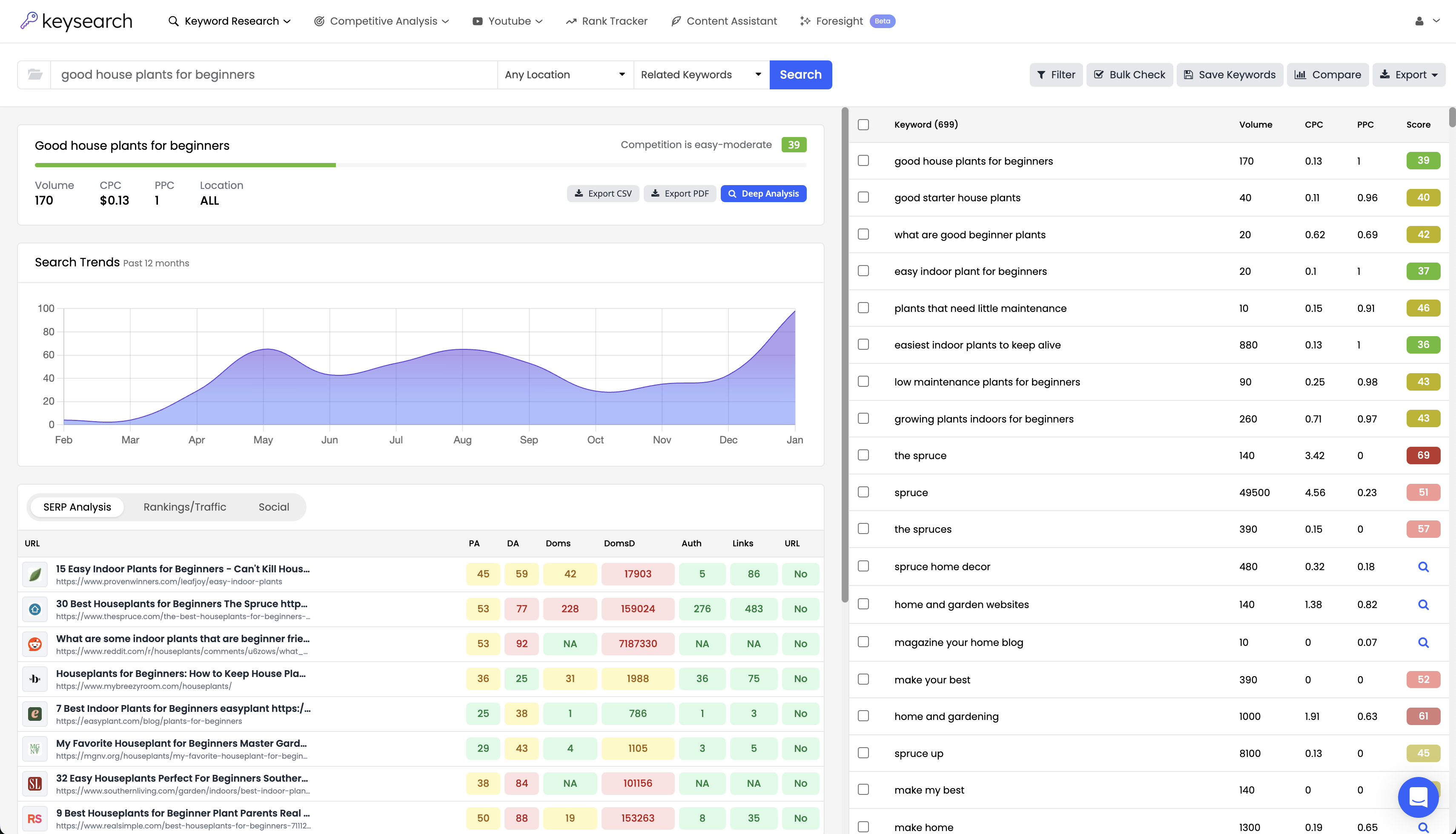Proper keyword research is the first step towards dominating your niche, bringing in an endless flow of organic visitors on autopilot. Whether you’re trying to rank on Google, Amazon, or any other platform, you need to make sure you’re uncovering the top keywords.
There are quite a few techniques involved, which is why we put together a more comprehensive keyword research checklist for those just starting out. But today, we want to narrow our focus to one specific aspect of automated keyword research: keyword clustering.
This is the concept of grouping similar keywords together so you can target them on the same page rather than dedicating separate resources to them. So, why is it important to group relevant keywords together – what are the benefits of keyword clustering?
We’ll share a few specific advantages you gain over the competition with effective clustering below, including improved content relevance to increased topical authority, better UX, streamlined content creation, and avoiding keyword cannibalization.
In essence, though, the benefits can be summed up with a single sentence: you’ll make the most of your SEO efforts, rank higher, and see more traffic as a result. That’s why it’s worth using our free keyword clustering tool at Keysearch. See what it can do for you today!
The Basics of Keyword Grouping
Before getting into the benefits of keyword clustering we need to take a step back and explain what exactly goes into this process. Also known as keyword grouping, it involves organizing related keywords into cohesive groups – or clusters. That’s where the name comes from.
Keyword clustering basically creates a clear roadmap for content development that ensures each piece targets a broader range of search terms while maintaining relevancy. The idea is that users often search with different variations of keywords to find the same information.
So while you could make different pages for each of those key phrases, it makes much more sense to target those terms on the same page – not just from the user’s POV, but a publishing perspective as well.
Maybe an example will help you grasp this concept better. Think about a broad topic, say “digital marketing strategies.” there are tons of other ways you could describe this – like:
- Digital marketing techniques
- Online marketing strategies
- Digital marketing practices
- And many more
If you were to create separate pages targeting each of these keywords, you would have a lot of pages saying almost the exact same things over and over again.
Not only would this make much more sense from a content creation point (saving time and SEO resources), but it leads to some other often overlooked benefits. That being said, let’s get into why it’s worth clustering keywords below!
Benefits of Keyword Clustering: Why is it Important to Group Relevant Keywords Together?
So why is it important to group relevant keywords together? It’s not just about being operationally efficient, there are actually quite a few benefits of keyword clustering. Like we said from the start though, it’s really as simple as better SEO results – enough said!
Improved Content Relevance and Context
Keyword clustering allows you to expand the depth and relevance of your content such that it addresses everything a reader would need to know about a topic.
So, why does this matter? Look at it from the perspective of Google, whose goal is to help users find what they’re looking for. In this case, that’s information. It makes sense that they would reward publishers who provide as much relevant context as possible, right?
While you may be able to do that with just a single keyword, grouping it with other related keywords guarantees that you’re approaching a topic from multiple angles and offering maximum insight for the reader.
Increased Topical Authority
If you aren’t already familiar with the concept of topical authority, you better get familiar. It can be the difference between completely dominating your niche and never gaining traction.
Building topical authority is the process of establishing your website as a trusted expert on a subject. Let’s say you run a digital marketing agency. The more content you publish about digital marketing, the more Google will view you as an authority on that subject.
This empowers you to compete with much larger websites, leveling the playing field so to speak. So how does keyword clustering fit in here?
Organizing keywords into related clusters and producing corresponding content creates a web of interconnected articles that thoroughly cover every aspect of a topic. It shows Google you’re not just creating a single resource on a topic, but are committed to unpacking it in its entirety.
We already covered that deeper, more helpful content is more favorable in the eyes of Google – this is just another example of that at play. But this time, the benefits of keyword clustering affect your entire website as a whole rather than just a single published resource.
Better User Experience
We said it before, we’ll say it again. Google (and other search engines, for that matter) have made it clear that their sole purpose is to connect users with what they’re looking for. User experience is the top priority.
Keyword clustering supports user experience as it consolidates everything a person needs to know on a topic onto a single page, rather than forcing them to bounce around from resource to resource on your website.
This translates into longer on-page times with reduced bounce rates. Both of these equate to better rankings and higher conversation rates.
Enhanced SEO With a Higher Ranking Potential
We could simplify the benefits of keyword clustering above to just this one single outcome: better rankings and higher traffic potential. But it’s not just about improving content relevance and topical authority. Clustering also maximizes the potential of any given page.
This is especially important in competitive niches where targeting one keyword alone wouldn’t bring in significant traffic. You can cast a wider net and ensure your content ranks for a much wider range of terms by clustering them together and including them on the same page.
Streamlined Content Planning and Strategy
Let’s be honest, creating content takes a ton of time and effort. If you’re a solopreneuer, you need to try to be as efficient with your content creation efforts as possible. On the other hand, those who can afford to pay a content writer still want to get the best bang for their buck.
This is one of the most enticing benefits of keyword clustering. There’s no need to waste time or resources creating similar articles to cover different variations of the same topic. Create one resource for all related terms and streamline your content planning and execution!
You’ll find that this approach simplifies other aspects of SEO and digital marketing, too. You won’t have to stress about choosing one of many pages to be your pillar page if you only have one, after all.
Avoiding Keyword Cannibalization
Keyword cannibalization is the death of many niche sites. It’s where multiple pages on the same site compete for the same keyword – and oftentimes, it’s the result of failing to cluster similar keywords together.
This confuses search engines and cuts into your content’s ranking power. If Google doesn’t know which of your pages to rank for a term because they’re too similar, the outcome will likely be that neither page ranks.
Keyword clustering mitigates this issue by consolidating related search terms into a single content piece or an interconnected group of pages.
Harness the Power of Keyword Clustering Today With Keysearch!
The benefits of keyword clustering should be crystal clear – now, it’s just a matter of reaping them yourself with the right approach! Fortunately, it’s as easy as a few clicks with our affordable keyword research tool!
Keyseach is your all-in-one SEO toolkit, from finding a niche to mapping out your strategy and executing it. You gain access to a suite of free SEO tools with a single account – one of the most powerful being our clustering tool.
Start by using Keysearch’s research features to generate keyword lists tailored to your niche. You can use search engine specific tools, like our:
- Amazon keyword research tool
- Pinterest keyword research tool
- Etsy keyword tool
- eBay keyword tool
- YouTube keyword generator
Whatever method you employ, you’ll upload a list of keywords into the grouping tool and they’ll be clustered together automatically based on semantic relevance and search intent.
From there you can fine tune further using our keyword difficulty checker, or find more opportunities with our long tail keyword generator. Balance search volume with relevance and difficulty and map out your priorities accordingly.
The result? You’ll have clearly defined keyword groups that you can seamlessly integrate into your content strategy. It takes just a few moments and it’s free to get started.
You can find other tools too ranging from a robots txt generator to SERP simulator, keyword density checker, niche finder, LSI keyword generator, duplicate content checker, and more.
Whether you want to learn how to research keywords for a niche site you want to start or how to find keywords for Pinterest, how to do keyword research for Amazon, how to do Etsy keyword research, or how to do keyword research for YouTube, you can trust Keysearch to help.
You don’t have to worry about what to do after keyword research, either – you can learn how to find keyword density with our solution as well to create perfectly optimized content. So, try it out yourself today and see how much simpler SEO can be with the right tools in your arsenal.
Closing Thoughts on the Benefits of Keyword Clustering
We hope this guide on the benefits of keyword clustering has left you with the clear understanding that this is something you need to incorporate in to your strategy.
So in closing, why is it important to group relevant keywords together? We could reiterate all the specific reasons, but it’s really this simple: you’ll get better SEO results with less work and fewer resources.
Considering how quick and easy Keysearch makes it, why would you neglect this aspect of keyword research? It takes just a few clicks and can streamline your strategy and bring out the full potential of your site.
Our blog has additional resources like what is a good keyword difficulty score, does keyword density still matter, how to find a profitable niche, advantages of long tail keywords, LSI vs long tail keywords, and more. Or, see how Keysearch stacks up to the alternatives:
Otherwise, the only thing left to do today is experience the benefits of keyword clustering firsthand by creating your Keysearch account. It’s free to start and you’ll be doining thousands of leading bloggers and companies who rely on our SEO toolkit.
Don’t settle for less than the best in your keyword research arsenal – harness the power of Keysearch today!
- How to Do Keyword Research for Free: Best Free Keyword Research Tools in 2024 - December 13, 2024
- Benefits of Keyword Clustering: Why is it Important to Group Relevant Keywords Together? - December 13, 2024
- What is Keyword Density in SEO and Its Importance - December 13, 2024







